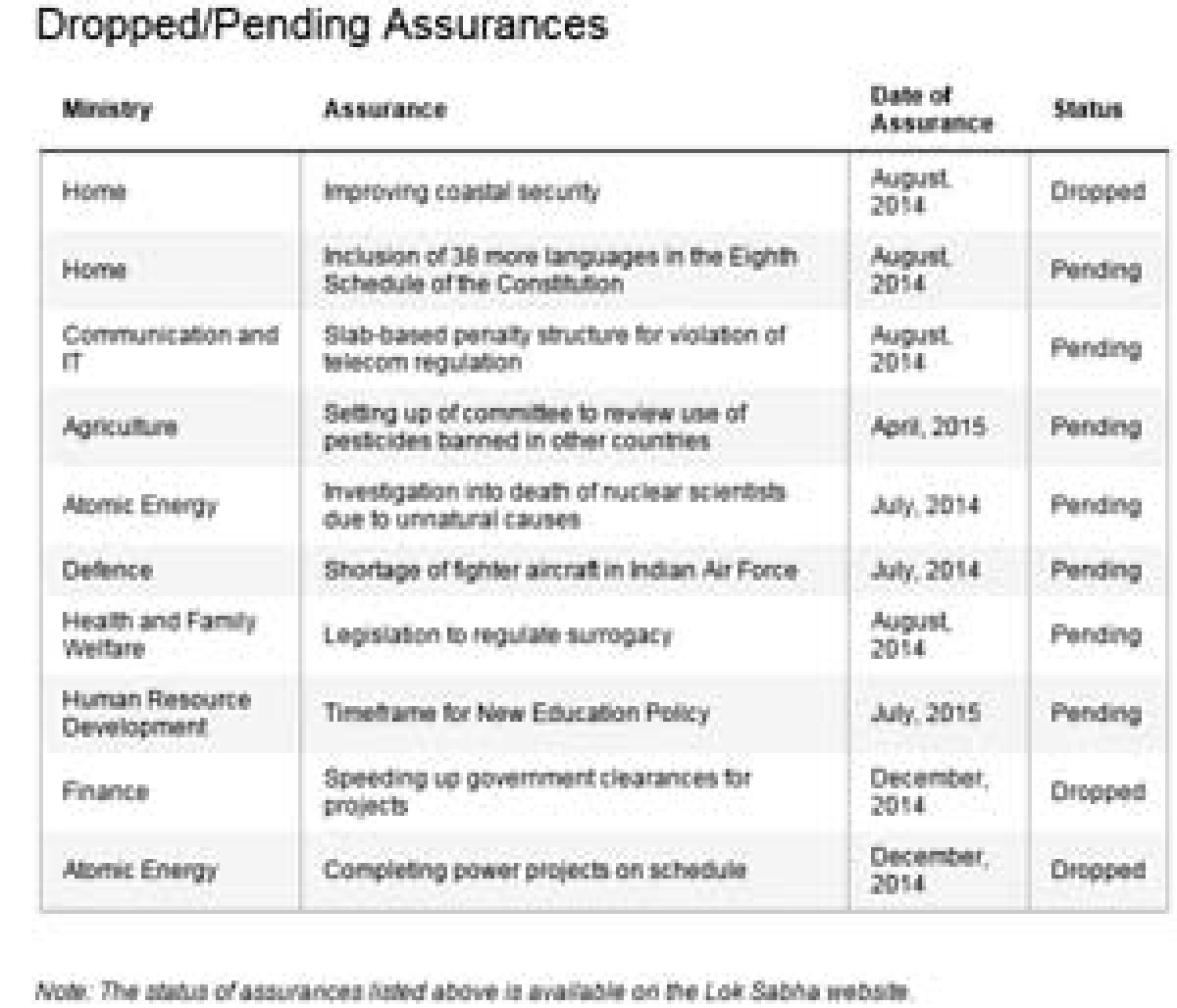Live
- Over 7,600 Syrians return from Turkiye in five days after Assad's downfall: minister
- Delhi BJP leaders stay overnight in 1,194 slum clusters
- Keerthy Suresh and Anthony Thattil Tie the Knot in a Christian Ceremony
- AAP, BJP making false promises to slum dwellers for votes: Delhi Congress
- 'Vere Level Office' Review: A Refreshing Take on Corporate Life with Humor and Heart
- Libya's oil company declares force majeure at key refinery following clashes
- Illegal Rohingyas: BJP seeks Assembly session to implement NRC in Delhi
- Philippines orders full evacuation amid possible volcanic re-eruption
- Government Prioritizes Welfare of the Poor, says Dola Sri Bala Veeranjaneyaswamy
- Two Russian oil tankers with 29 on board damaged due to bad weather
Just In

Two-thirds of the Central government ministries have not implemented more than 50% of “assurances” given to Parliament, even as the government completes two years in office, according to data from the Lok Sabha (Lower House of Parliament).
Assurances, promises made by government to Parliament do not expire
Two-thirds of the Central government ministries have not implemented more than 50% of “assurances” given to Parliament, even as the government completes two years in office, according to data from the Lok Sabha (Lower House of Parliament).
IndiaSpend previously reported that 80% assurances given to the 16th LS were pending; that is now down to 58% in 2016. Assurances promises made by government to Parliament do not expire.
The government replies to 250 questions every day from Members of Parliament (MPs) during a Parliamentary session. While replying to questions in the house or during discussions on bills, resolutions etc., ministers give assurances, undertakings or promises to consider an issue, take action or provide information later.
These assurances, compiled by the Ministry of Parliamentary Affairs and the Lok Sabha Secretariat, are sent to the Parliamentary Committee on Government Assurances. The committee must ensure assurances are implemented within three months. Secretaries of ministries are supposed to review assurances to Parliament every week or fortnight. When the Lok Sabha is dissolved, assurances pass on to the next government.
PMO made one assurance in 2014 and has not yet kept it. Eight ministries have not acted on 80% of assurances to the Parliament; three ministries have implemented more than 75% of assurances given to the Parliament.
The Prime Minister’s Office gave one assurance that it would release reports of performance and evaluation system of ministries for 2013-14 to the 16th Lok Sabha, and has not fulfilled it since 2014.
Despite assurances from the PMO that the system has been approved and evaluation reports of ministries would be released, that has not happened for 2013-14. Not far behind are the Ministries of Social Justice and Empowerment, Minority Affairs, and Road Transport and Highways with 83%, 82% and 75%, respectively, assurances pending.
As many as 58% of assurances made to Parliament by the home ministry–which requested two assurances dropped–are pending. One of the dropped assurance concerns the establishment Coastal Police Stations, a fallout of the 26/11 terror attacks on Mumbai. In August 2014, the home ministry said it was implementing phase 2 of the coastal-security scheme. In November 2015, it requested deletion of the assurance.
A pending home ministry assurance since 2014 concerns the creation of criteria to select a language for “official” status in the Eight Schedule of the Constitution. As many as 38 languages are awaiting the home ministry’s clearance to join the list of 22 official languages.
India has emerged as a favourable destination for surrogacy, and Assisted Reproductive Technology (ART) industry has evolved into a Rs 2,500-crore ($365 million) business annually. The health ministry acknowledged that there could be surrogate pregnancies, including in rural and tribal areas, that result from exploitation of women. The government’s assurance of a law to regulate surrogacy in India is pending since 2014.
India’s tardy implementation of power projects has led to frequent cost escalations. When asked by a Member of Parliament if nuclear projects were getting enough money to be finished on time, the government said (on December 10, 2014) said that “all efforts are being made to complete and commission the projects within the approved time frame”. However, this assurance was dropped in February 2016, according to the Lok Sabha website.
The Ministry of Law and Justice tops the charts with 146 assurances during the 16th Lok Sabha, fulfilling 27% by May 12, 2016. The Ministry of Communication and Information Technology gave 129 assurances and implemented 40%; the Ministry of Finance 121, implementing 57.9%; the Ministry of Human Resource Development 113 assurances, implementing 35%; the Ministry of Railways 107, implementing 44%.
The committee on government assurances has reprimanded the government in its reports for several assurances being pending for years, some for almost a decade. “17 assurances from the Ministry of Human Resource Development are pending for implementation, in fact, first two assurances are pending for nearly a decade,” the report said. (Agarwal and Sibal were fellows 2015-16 at PRS Legislative Research) .
By Akshay Agarwal & Prateek Sibal

© 2024 Hyderabad Media House Limited/The Hans India. All rights reserved. Powered by hocalwire.com







